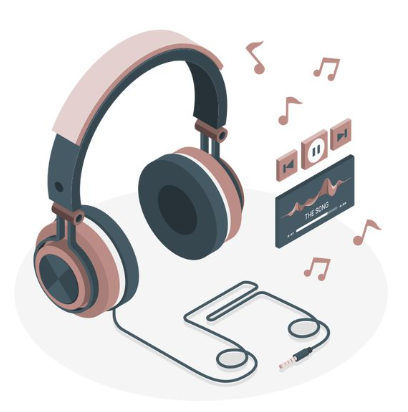Digitalization of Music
As everything evolves through time, we as humans have dramatically advanced in the technology section. We tend to look at that in a positive way, because it gives a huge hand to help out in finishing something faster, connects and reaches people across the globe, and wastes less physical material, so it’s environmentally friendly.

Credits: Google Images
From the earliest drum beats to the most sophisticated symphonies, music has been used for entertainment, expression, ceremonies, and much more. The way we consume, create, and distribute music has evolved over time, and with digital technology, we have witnessed a major transformation in the music industry. In this article, we will explore the digitalization of music, its impact on the music industry, and where that can lead us.
Before we explore this phenomenon and its effects, we need to understand what does the digitalization of music actually mean?
Digitalization of music refers to the conversion of analog sound waves into digital audio files that can be stored, edited, and distributed using digital technology. The digitalization of music began in the 1980s with the advent of digital audio recording technology, which allowed musicians to record and edit music using digital devices instead of analog tapes. The introduction of the compact disc (CD) in 1982 marked a major milestone in the digitalization of music, as it provided a new, high-quality, digital format for music storage and distribution. However, it was not until the development of the MP3 format in the mid-1990s that the digitalization of music truly took off. MP3s allowed music to be compressed into small, digital files that could be easily downloaded, shared and played on digital devices like computers and portable music players. The rise of digital music platforms like iTunes, Spotify, and Amazon Music has revolutionized the way music is distributed and consumed. Instead of buying physical CDs or records, listeners can now stream or download music directly to their digital devices, anytime and anywhere.
Now we will jump a bit into Kelda’s genre of hip-hop. Hip-hop music is a genre that has always been greatly impacted by the digitalization of music. In fact, many would argue that hip-hop was one of the first genres to fully embrace digital technology and use it as a tool for creativity. Digital audio workstations (DAWs) like Pro Tools and FL Studio have become essential tools for hip-hop producers and beatmakers, allowing them to create complex beats, sample sounds, and manipulate audio in ways that were not possible with analog equipment. The use of digital tools has also made it easier and more affordable for independent hip-hop artists to produce and distribute their music, without the need for major record labels or expensive studio time.
Also, the rise of digital music platforms like SoundCloud and Bandcamp has created new opportunities for hip-hop artists to share their music and connect with fans worldwide. By uploading their music directly to these platforms, artists can reach a global audience without the need for traditional music distribution channels. Kelda has been using these channels to spread her word and get more people attached to her music because, in her expression through music, people can find more of themselves.
Of course, the rise of social media has played a significant role in the hip-hop culture, and the music industry in general. Platforms like Twitter and Instagram have given artists a way to connect with fans, promote their music, and build their brands. Many hip-hop artists, such as Keldamuzik, Cardi B, and Megan Thee Stallion, have built a massive following on social media, using it as a tool to share their music, connect with fans, and stay engaged with their audience.
The digitalization of hip-hop music has also had a profound impact on the way hip-hop culture is consumed and experienced. With the rise of streaming services like Spotify and Apple Music, listeners can access a massive library of hip-hop music anytime and anywhere. This has created new opportunities for listeners to discover new artists and explore the diversity of hip-hop music. Kelda is always using these platforms to reach a new audience and introduce her music to a wider border.
The digitalization of music has also transformed the way musicians earn their bread and butter from their music. Instead of relying solely on record sales or concert tickets, musicians can now earn revenue from digital music platforms, merchandise sales, and sponsorships.
In conclusion, the digitalization of music has had a profound impact on hip-hop music, transforming the way it is produced, distributed, and consumed. By embracing digital technology and using it as a tool for creativity, hip-hop artists have been able to push the boundaries of the genre even more and reach a global audience like never before
Challenges and Opportunities of Digitalization in Music
While the digitalization of music has brought many benefits, it has also presented challenges and opportunities for musicians, record labels, and the music industry as a whole.
One of the biggest challenges facing the music industry today is the issue of piracy. With digital music files being so easy to copy and distribute, many musicians and record labels have struggled to protect their intellectual property and prevent unauthorized distribution of their music. This has led to lost revenue for the music industry and has forced many artists to rely on live performances and merchandise sales to make a living.
On the other hand, the digitalization of music has also created new opportunities for musicians to reach a wider audience and connect with fans in new ways. With the rise of social media and digital marketing, musicians have been given new ways to promote their music and connect with fans. Platforms like Instagram, YouTube, and TikTok allow musicians to share their music, performances, and behind-the-scenes content with a global audience, building their fan base and generating buzz for their music. This will make their audience feel more aware of the whole process, and the artist close with their fans!
